Hey, dear reader, this is Bogdan, and you’re about to go through the only guide you’ll need to learn how to rank your Google Business Profile at the top of the search results.
This guide will be as evergreen as possible, given the fact that Google constantly changes and updates are almost a daily occurrence.
Don’t worry, the tips I’ll give you here matter almost always, and you’ll be able to figure out Google Business Profile (GBP) even if you don’t know anything about local SEO in the first place.
It doesn’t matter if you’re in a very small town or in a big, competitive metropolis like Dallas or Houston; you’ll still have something to gain from going through this guide.
You’ll first learn the true value of your GBP, what determines who is at the top of the search results, and then how to achieve that yourself.
So, without any further ado, let’s get right into it!
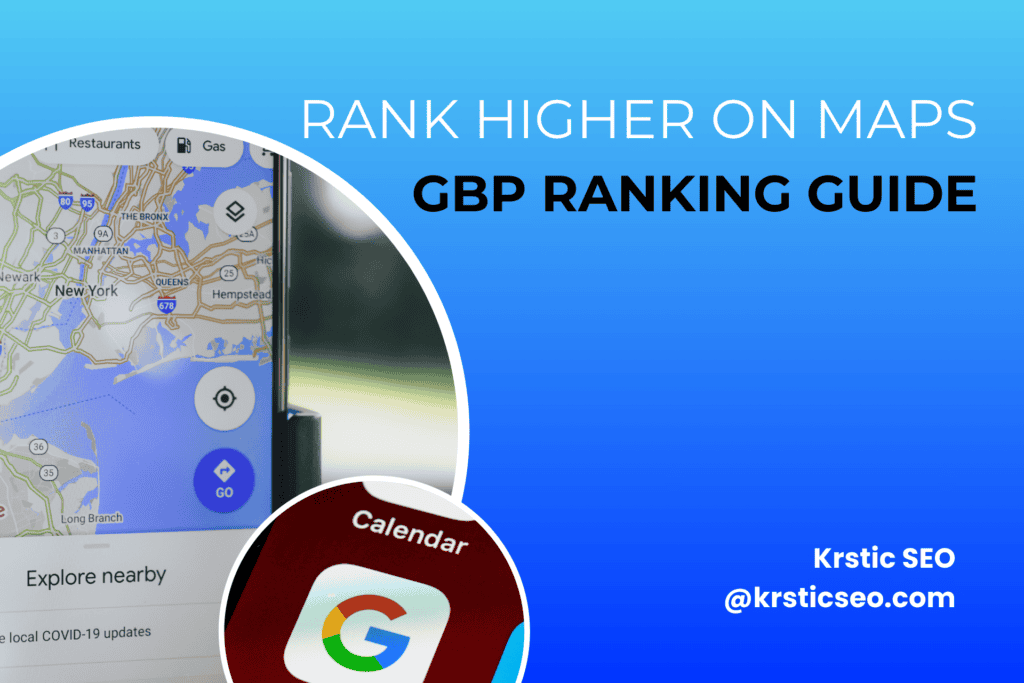
~22 Minute Read
Why You Should Care About Your Google Business Profile
Multiple reasons.
Firstly, 98% of consumers went to the internet to find a local business in 2022, up from 90% in 2019. (Source: BrightLocal)
Then, 87% of consumers have used Google to pick a local business in 2022, up from 81% the previous year.
According to the same survey, Google is the most trusted platform for consumers to check out businesses’ reviews across all industries.
And lastly, 98% of consumers have read reviews from local businesses in 2022.
This data comes from one of the most credible and trusted companies in the local SEO space, and it goes to show just how much people trust Google when it comes to finding and picking a local business for their needs.
And this is ESPECIALLY true for emergency service businesses. Many times, consumers don’t even check out a company’s website when in need of urgent assistance. Instead, they just open up their GBP and read a couple of reviews before making a decision.
This is why you should pay special attention to your GBP as a:
- Roofer
- Plumber
- Water damage restoration company
- Electrician
- Pest control service
- And any other type of service where customers urgently need your help (perhaps an emergency dentist as well)
Even if you’re not in an emergency business but customers still NEED you (pressure washing, car detailing, junk removal, painting, and others), GBP mostly matters as well. Longer sales cycle niches like solar or remodeling will have a slightly different approach, but the general rules outlined in this post still apply.
Your GBP is not just something you should hand off to your teenage nephew to have fun with. You should start viewing your GBP as an asset, because that’s exactly what it is.
I’ll use the water damage restoration industry as an example throughout this post.
For context, this is how a normal Google search results page looks like:
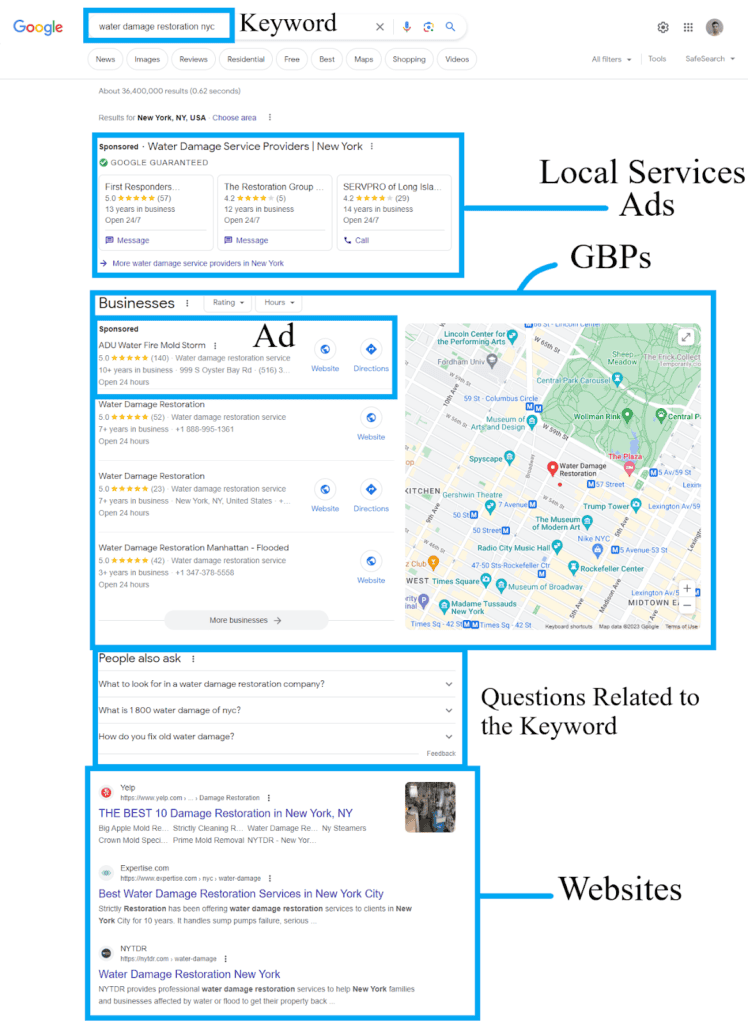
After a potential customer searches for a keyword typical for the niche (USUALLY a category name in GBP), like “water damage restoration NYC” or “water damage restoration near me,” they’ll first come across Local Services Ads right at the top of the page. Note that these are not available for all industries and are currently just available in the US.
These ads are helpful, but they are not the topic of today’s guide. Just know that these are pay-per-lead types of ads, where you’ll be charged per inquiry you get from the ads you run. Similar to Angi’s or Thumbtack.
Anyway, we’ll touch on them in another guide.
For now, let’s focus on GBP.
What comes right after Local Services Ads are GBPs. In many cases, some Text Ads might appear before GBPs as well, but in this specific search, they did not show, at least not at the top. They appeared at the bottom of the search results page, which also happens quite often:
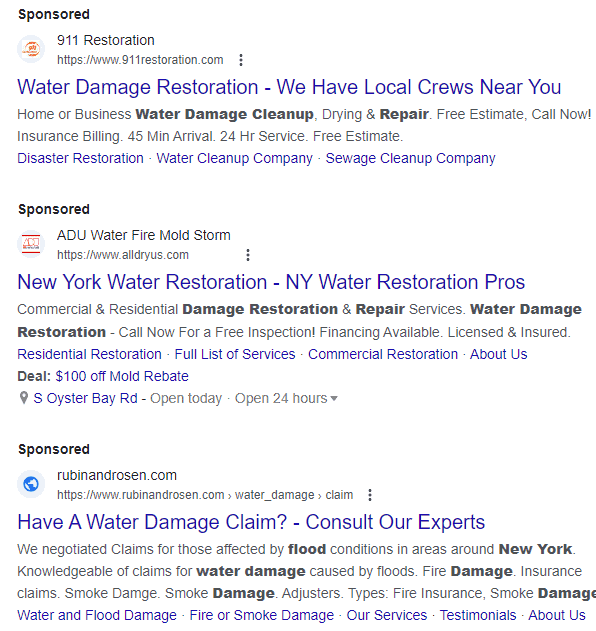
Local Services Ads and Text Ads get some of the traffic that comes from this keyword, but not all of it.
In fact, we could perhaps argue that the least amount of traffic goes to paid advertising.
Yeah, that’s right! According to FirstPageSage, ad results get 3-2% of the clicks each. This refers to both Local Services Ads and Text Ads.
First, second, and third ranking GBP listings, however, get 17.8%, 15.4%, and 15.1% of the clicks, respectively.
And that’s quite a lot of clicks when you look at how many people search for our keyword every month:
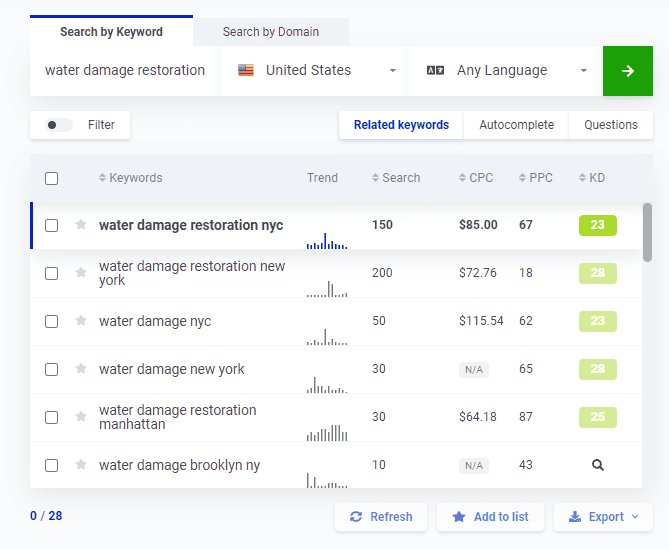
This data comes from Mangools, the tool I frequently use for local SEO. It gets its data directly from Google, so it’s pretty accurate.
For clarification, the “Search” bar shows how many times a keyword has been searched per month on average. The “CPC” bar shows how much money advertisers are paying for each click they get from consumers searching for these keywords. That’s per click, not per sale.
Don’t worry about other bars.
When you look at the CPC, the reason advertisers are paying so much for these clicks is because these keywords are buyer intent-driven. In layman’s terms, when this keyword gets searched, the person searching it is ready to spend money.
Think about it. Who would be more likely to turn into a customer for your business – a person searching for “water damage restoration NYC” or a person just searching “water damage restoration”?
The second person might be looking for a written guide or products. It doesn’t have to be just the service of a professional. However, the first person also searched for the city of New York, meaning that they’re exploring options in their local region.
We could confidently assume that the first person is much more likely to buy your service than the second person.
You can also see that there are many similar keywords to our “water damage restoration NYC” keyword that get a lot of traffic too.
Hypothetically, if you were to rank your GBP listing for all of these keywords (difficult but possible – in smaller cities, definitely possible), that’d amount to a lot of potential customers viewing your listing every single month.
Where do the rest of the clicks go?
Almost 40% of the clicks go to the #1 ranking website. I’ll show you how to rank sites in another guide.
But by now you should see why a GBP listing is so valuable. Top ranking listings get around 15-18% of all traffic; the traffic you’d be getting comes from people who are ready to spend money; and if you’re in a big metropolis like New York, there’s a potential for a lot of such traffic.
What about businesses in smaller cities?
You guys also have a lot of benefits to take advantage of. More about that later on.
How to Rank Your Google Business Profile
Now it’s time for the fun stuff.
I get all of what you’re saying, Bogdan, but how the heck do I rank this thing?
Well, before I get into the actual steps, you first need to understand how Google ranks its GBPs.
So, let’s just ask them directly!
According to this article from Google, there are three main ways Google positions listings in local search – relevance, distance, and prominence:
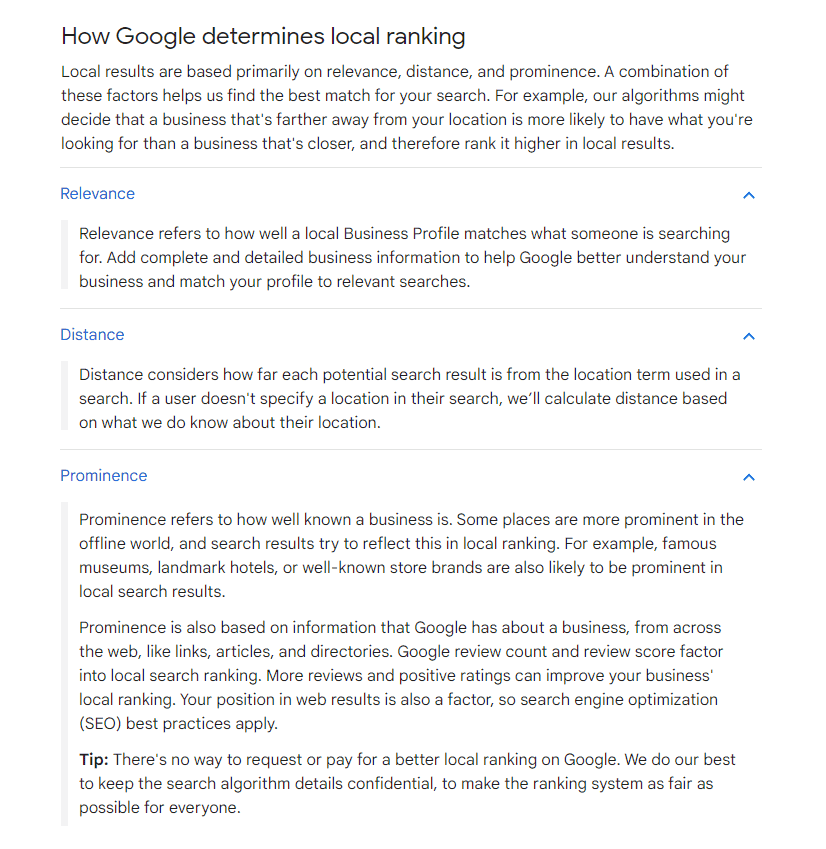
Like most things Google, these explanations are pretty vague, and a business owner with little to no knowledge about SEO has no benefit from these tips.
After all, Google’s algorithm is meant to be kept secret, so giving away everything you need to do to be at the #1 spot would work against them since you’d feel no need to pay for advertising if you’re getting all of your leads for free by being at the top of all searches.
Instead, Google will just give you little clues as to what to do to improve your GBP listing, as you can see in the article mentioned above.
But that won’t be the case here! Let’s elaborate on each of these points now:
Relevance
To be as relevant to a specific keyword or overall niche as possible, you should have all of your online assets, not just GBP, precisely optimized (check out our Google Business Profile optimization guide; start from there).
This also includes your website and all other social profiles and directory listings on sites like Yelp or YellowPages you might have.
Optimizing for relevance does NOT mean just stuffing “water damage NYC” dozens of times across your site and GBP. That could work before, but not anymore. The game has changed.
For you to understand what you need to do instead, we first need to cover what relevance really means. This concept has A LOT to it, but in trying to keep this guide as beginner-friendly as I possibly can, I’ll keep it short and sweet.
Simply put, Google wants to know if you’re a good answer for a searcher’s query both topically and geographically.
To rank for a keyword, your business needs to be topically relevant to it. Referring to the example above of “water damage NYC”, this would mean including words on all your assets and even building pages on your site around topics like sewage cleanup, flood damage, fire damage, emergency responses, and more.
It’s not just about stuffing “water damage NYC”, but including as many words and phrases that fall under that keyword’s “umbrella”.
And while this is way more important for ranking websites, it still plays a role in GBP ranking too.
People don’t just search for “water damage restoration”. They also look for specific services within the niche, like sewage cleanup or flood restoration.
See it yourself:
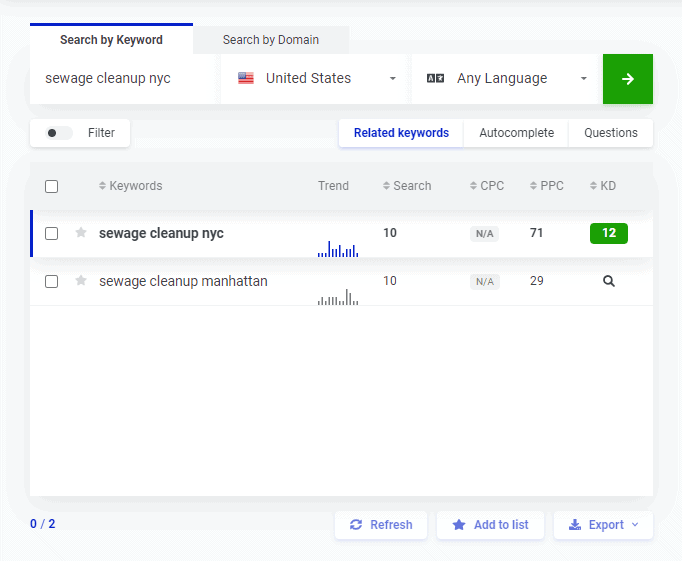
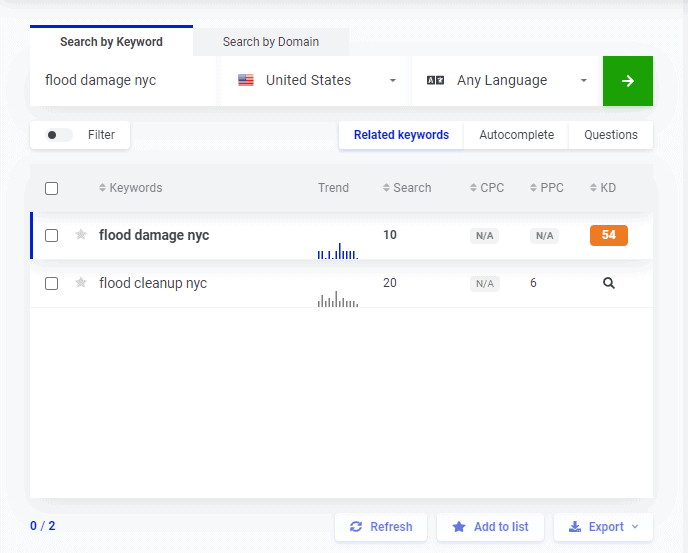
Not as many searches?
Yeah, that’s true. But these keywords are also much more targeted and have even more buyer intent.
But if you properly optimize your GBP and other assets, the GBP will rank for both the head keyword AND these more targeted keywords.
This ultimately ends up generating more leads and money for you and your business.
In GBP, this simply includes adding Sewage Cleanup and Flood Damage Restoration as your services in the Services field.
It also includes adding these terms to the Description of your GBP.
And lastly, encouraging your customers to mention what service they got from you when leaving a review of their experience with your company.
When going over the Prominence part, I’ll elaborate on this review generation strategy more.
Another good way to enhance your relevance to the topic is to answer questions people frequently ask that are related to the keyword.
Remember these?
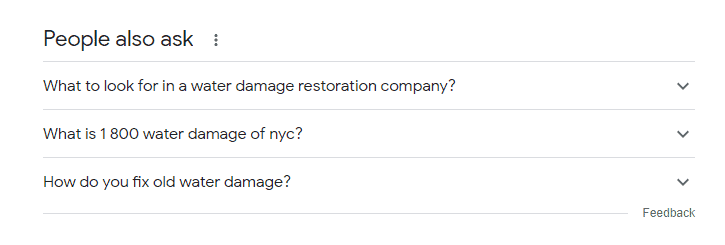
When you click on one of these, Google will add more suggestions, providing you with an endless source of questions you can answer on both your website and GBP via the Questions and Answers (Q&A) section.
You should also answer any questions you personally get asked all the time about your company via the Q&A section as well.
And lastly, apply all of these tips to your other online assets – Yelp, YellowPages, FourSquare, Facebook, LinkedIn, and other pages. Fill them out thoroughly and enter all the services.
What will massively help Google figure out your “relevance” is filling out every single field they have available inside their dashboard. You should also do the same on other assets, and this will help your GBP too.

These are the fields you should see when you open up your GBP.
Take advantage of all of them. Google has set these up for a reason. They want you to use them. So do it.
Services? Add all of your services to that section. You’ll also have the option to add around 300 characters as a description of the service. Do it.
Products? You perhaps shouldn’t use this feature as a service-based business since you don’t sell products, just services. These are more for eCommerce businesses or in-person shops. However, a lot of service-based businesses use this feature to list their services too, and they get away with it. This is a riskier endeavor, but you can still try it.
Photos? Upload photos tagged with keywords. These shouldn’t be stock photos but real photos of you, your office, your crew, your equipment, your trucks, and your projects.
Add your website to the GBP listing, and make sure the site is properly optimized for the keyword too. This will, in turn, help rank the GBP even higher.
What about the “geographical” part you’ve mentioned?
It also revolves around including relevant words, but these should be the areas you serve. Don’t just mention the city where you’re based; mention all of the territories you can cover.
On the website, besides pages about your services, you should also have so-called location pages.
These by themselves are a topic for another day, but just know that these are the pages that will actually rank your website for keywords in search results that fall under GBPs.
Distance/Proximity
“Distance considers how far each potential search result is from the location term used in a search. If a user doesn’t specify a location in their search, we’ll calculate distance based on what we do know about their location.”
Says Google.
This one should be the easiest for you to comprehend.
When a user performs his/her search, Google will take their IP address and previous search history to determine where they’re based and then provide them with businesses that are closest to them.
If you have your address listed on your GBP, this will be to your advantage.
If not, Google will take the coordinates of your listing (it will still have them, even without the address displayed) and then rank you accordingly.
In most cases, Google gives businesses a maximum 10-mile radius to reach. In most cases, it’s anywhere between 4 and 10 miles. Take a look at the photo below:
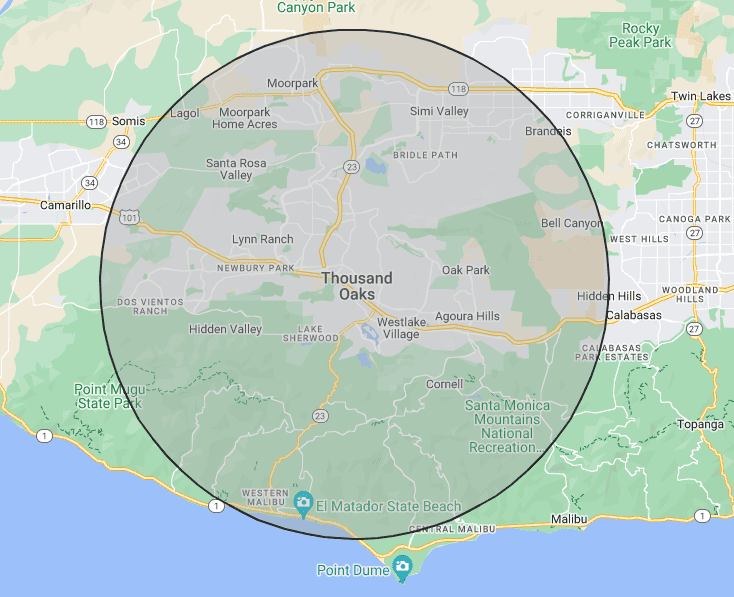
This circle represents a 10 mile radius for an address in downtown Thousand Oaks (randomly selected). Let’s say that your business is based in downtown Thousand Oaks.
Your listing, if built correctly, should theoretically show up for searches like “water damage restoration” or “water damage restoration near me” within this radius. It should also show up for searches like “water damage restoration Thousand Oaks” AND “water damage restoration Agoura Hills”.
Even though your business address is NOT in Agoura Hills, since Google has provided you with a generous 10-mile radius (let’s assume they did, but it might actually be less or, although very rarely, be more), you should show up there too.
This is how brands that know what they’re doing dominate search results.
This isn’t always concrete, though. GBPs in metro areas with much more competition have less space to expand, and their radius will be narrower.
Other businesses in remote, less densely populated territories could perhaps see a wider radius. It’s all dependent on where you’re based.
It’s just important to optimize for geographical relevance, as explained before, for all locations you cover.
Sticking to our example, this would include Thousand Oaks, Agoura Hills, Simi Valley, Moorpark, and others.
Prominence
Ah, here we go. This is where most of your time will be spent.
Google defines prominence as “how well-known your business is”. It looks at various signals to determine this.
Take two individuals. One is famous and well-known, while the other is not. They both claim one thing to you. You know neither of them personally. Their claims are exactly the same. But who would you be inclined to trust more?
The famous person, simply because of their prominence. Even if the other guy has a little bit better claim, you’ll still likely go with the famous guy.
This is how Google views websites online. All of us can put “We are the best New York City water damage restoration company” on our website, but Google will then look at our prominence to determine who gets the #1 spot.
Your website’s prominence will also greatly influence your GBP rankings.
Website’s “prominence” is, simply put, backlinks. What are backlinks?
Backlinks
Backlinks are, simply put again, links pointing towards your website from other websites.
Website A links to website B. Website B has one backlink from website A. For website B, a link from website A is counted as a backlink, while for website A, that same link is counted as an external link.
The more backlinks you have, the more prominent you are (in theory). Not all backlinks are the same. In Google’s eyes, one backlink from the Washington Post is not the same as one backlink from an unknown, spammy website.
So, to paraphrase, the more good backlinks you have, the more prominent you are in Google’s eyes.
This is where things may get really confusing for you – which backlinks are good and which are not.
You still might not even get what a backlink is.
Don’t worry. You can message me with questions at any time. Just know that backlink building, while it may seem confusing, can, for the most part, be completely outsourced.
But let’s get into the different backlink types you need for your website in order to boost its rankings AND your GBP rankings at the same time.
- Citations
Citations are listings on directory sites like Yelp, YellowPages, SuperPages, DexKnows, and others.
Certain citations hold more “weight” than others, and a general list of citations every business, including water damage companies, should have is again perfectly outlined by BrightLocal. See the top 50 business directories.
There are plenty of services that can build these out for you, or you can pay BrightLocal directly.
- Social Profiles
Your Facebook page can be used for more than just collecting likes. You can link from your page back to your site to give it some “weight”.
Now, just a link from your Facebook page alone won’t do much, if anything, for your brand. However, 100-200 social profile links can help build your prominence online.
These social profiles will later show up when somebody Googles your brand name.
How do you know if your brand is prominent?
One of the ways is to just Google your brand name and see how many search results show up with your brand name in the title of the search result. That search result should also ideally mention your brand name, have your business address and phone number listed, and link to your website.
If you want more prominence, you want more of these types of search results.
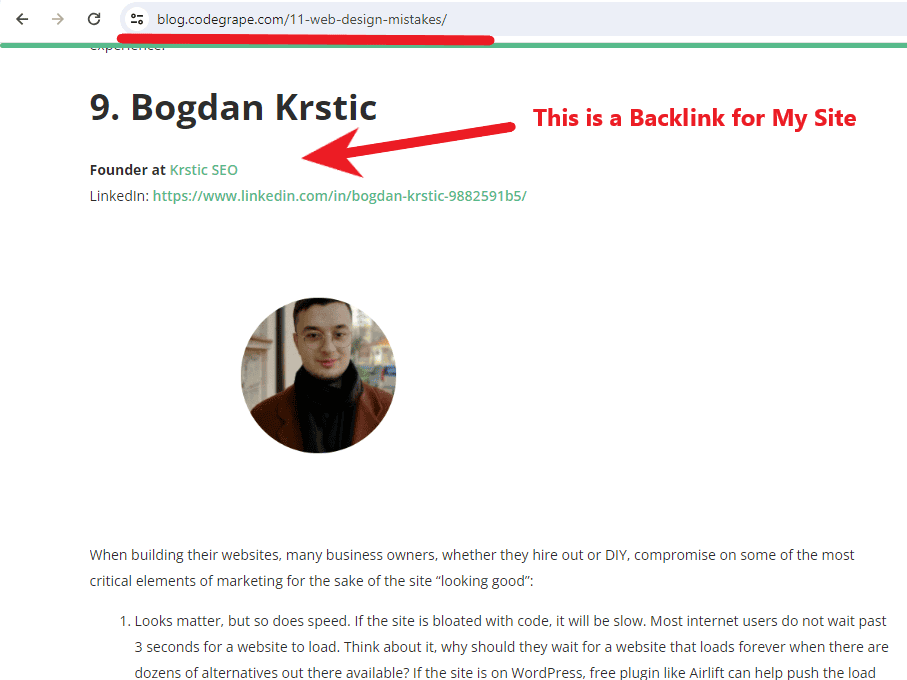
Reviews
Another part of online presence, now specifically related to your GBP listing, is reviews.
Google says:
“Google review count and review score factor into local search ranking. More reviews and positive ratings can improve your business’ local ranking.”
Reviews matter. A lot.
It’s not just about rankings; reviews can also significantly boost your sales. Customers are naturally more inclined to entrust a business that has carried out the same service successfully in the past and has customer testimonials to back up their claims.
How do I get more reviews (legitimately)?
Obviously, you want to provide a great service to anyone you interact with. Some people leave reviews even before purchasing a service because of the company’s great conduct.
Satisfied employees and business partners also leave reviews for GBP listings, and Google seems to approve of that.
So take advantage of any such relationships to get a quick boost.
Now, when you’re asking a customer to leave you a review, don’t just tell them to leave 5 stars and end there.
Instead, have them tell the whole story:
- How did they hear about your company?
- How was their first interaction with your company?
- What was the estimation process like?
- What services did they need?
- How did your crew carry out the service?
- Did the crew treat their property with respect?
- What are the final impressions? – would they recommend you to their friends and family?
These are just some of the questions that come to mind.
The goal is for each review to have as many of the topically-relevant words as possible – water damage, restoration, cleanup, repair, replacement, company, estimate, emergency, broken pipe, sewage cleanup, flood, mold, and so on.
This is where the true results will come from.
Want to know how to scale this even further?
Ask these customers to also rate you on Facebook, Yelp, YellowPages, or other sites.
As I’ve said before, Google picks up information and ratings from these third party sources, which is clearly evident when you search for some brand names with a lot of customer reviews.
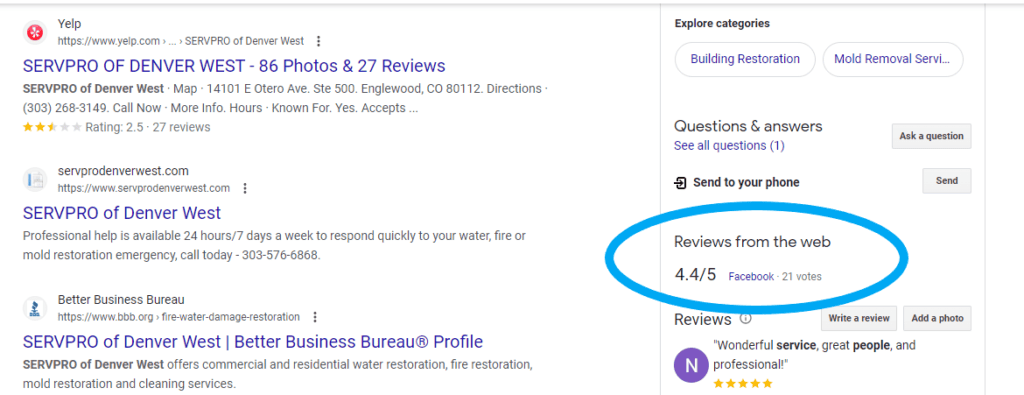
And the final key is consistency.
Reviews take a lot of time to generate.
Ask every single customer for a review. Be unapologetic, especially if you’ve provided a great service to them. In most cases, they should be more than happy to rate your company if you kindly ask.
Frequently Asked Questions
Why SEO?
I believe that SEO is especially important for service area companies.
Because social media marketing works better for more “fancy” businesses like, for example, restaurants, but restoration companies, roofers, plumbers, and others usually find more success with marketing on Google, not just with SEO but with Pay Per Click (PPC) advertising as well.
Over a third of all Google searches are local. This tells us that people are using Google to find local products and services more and more.
Think about it. When a potential customer is not using word of mouth to find a company to help them with water damage restoration or mold remediation, what are they going to do? Where are they going to find that company?
On Google, of course. It’s the easiest and fastest way to solve that problem.
This is why you want to take full advantage of local SEO and start working on it right now.
How Long Does Ranking Take?
This highly depends on the level of competition for the keywords you want to target and your budget (as I’ve mentioned before, you’ll likely have to pay for most backlinks you get). The more competitive an area is, the longer it will take to see results.
Note that SEO shouldn’t be the only part of your overall marketing strategy. While your organic search rankings are kicking in, you should be focusing on other elements of digital marketing as well.
SEO or Google Ads?
Both have their own benefits and drawbacks. However, we highly suggest that you do both because they go hand-in-hand. Showing up in both paid and free Google search results dramatically increases the lead volume you’re receiving.
Look at it as a real estate and monopoly concept.
Referring back to the image from the beginning:

Ideally, you want to take up a place in each of these blue slots – Local Services Ads, GBP, and websites (ignore questions). Also, Text Ads, it’s just that they didn’t show up in this particular example.
This would total up to four spots of real estate on one of the most valuable pages on the internet for your business – search results for your “money” keyword.
Add up the percentages I’ve mentioned before, and you can see how the chance of getting the attention of a consumer who is in buyer mode right at the time of performing his/her search dramatically increases.
And, as a sweet bonus data point for you, studies show that paid search ads can also boost the results of SEO campaigns.
So, you should ideally do both at the same time.
Conclusion
That’d be it!
I hope this guide was helpful enough to at least get you started.
Working on your GBP listing is sooooo worth it, so I hope you consider it.
If all of this sounds like too much work, it’s because it is. Results that you can get by being at the top are something everybody in the space wants, so it won’t come easy.
But you also don’t have to do any of these things yourself. Besides review generation, which has to be done by you, all of these processes can be outsourced.
Message me on Facebook or email me at [email protected] to further discuss this. If you don’t want to work with me, just feel free to ask me anything and I’ll try my best to give the most insightful answer possible.
Other than that, take this information and apply it. It will take a while, but it will be worth it in the end.

Bogdan is a local SEO expert with over 3 years of experience helping businesses grow using Google. When he is not helping businesses grow, he works on his own SEO projects, works out, takes long walks, and watches Suits, which is completely ironic given how rarely he dresses up in a suit himself.
